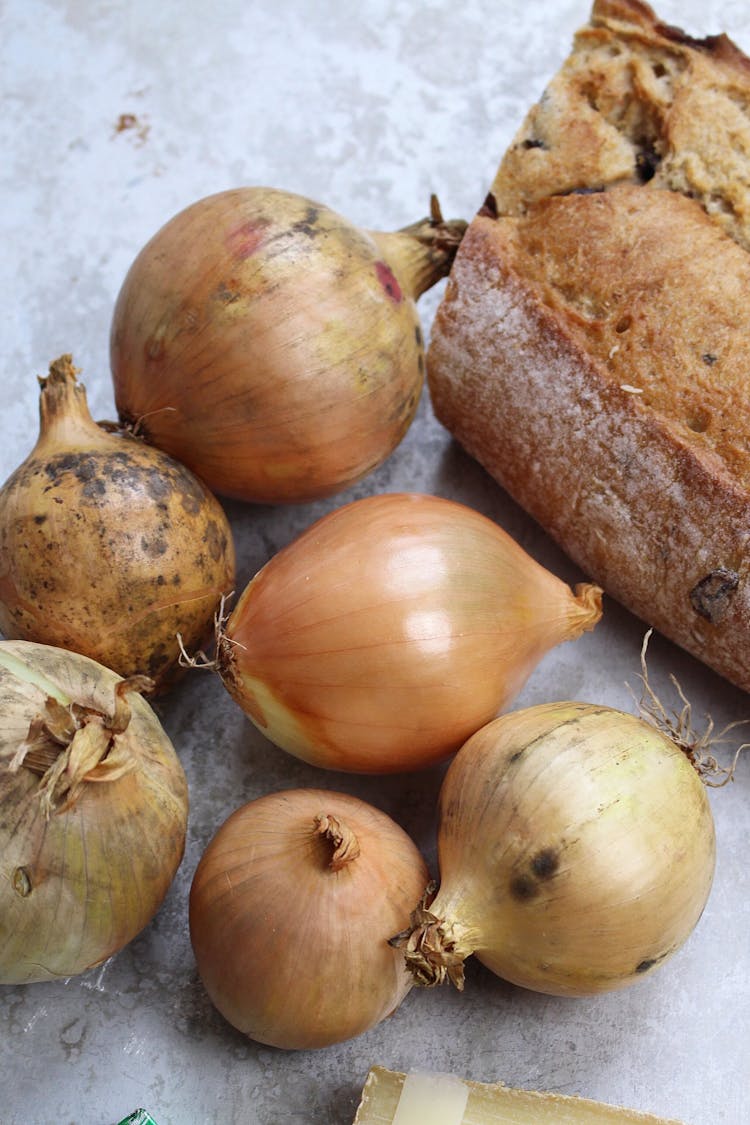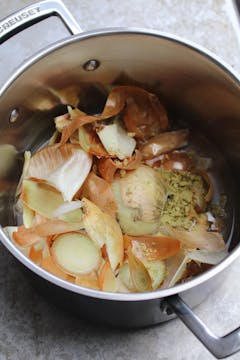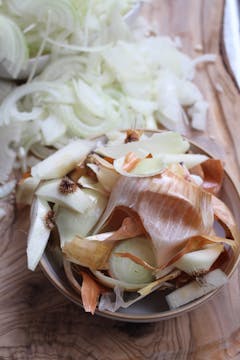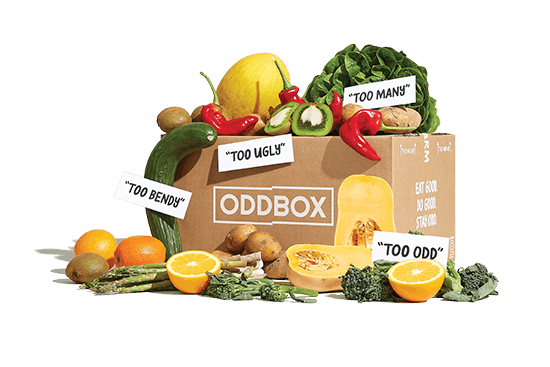How to store, prep & cook your onions
Whether you want to know how to perfectly dice an onion, or you have surplus of them that need using up, we’ve got you covered.
Tips & recipe ideas courtesy of our guest ODDBOX chef Camille, @callherchef

HOW TO STORE:
Store your whole onions in a cool, dry, dark and well-ventilated room.
HOW TO DICE YOUR ONIONS IN 4 EASY STEPS:
- Cut the top off the onion with a sharp knife. Do not cut the root. 2- Cut in half through the root. Then peel the onion.
- Lay the onion cut-side down on your chopping board, with the non-root end facing you. Make 4-5 cuts vertically through the onion, being careful to not cut through the root. This way the onion holds its shape.
- Turn your onion so that the root end is now on the left and the non-root end is on the right (if you are left handed this will be reversed). With your knife parallel to the onion, make 2-3 cuts horizontally through the onion, still without cutting through the root.
- Now, chop your onion with cuts running perpendicular to your first vertical cuts.
13 AMAZING RECIPE IDEAS FOR LEFTOVER ONIONS
CARAMELISED ONION
Slice the onion and cook for about 1 hour in a little olive oil, or until they are dark golden brown. Season to your taste, and deglaze with balsamic or sherry vinegar (or alcohol such as brandy). For extra sweetness add a little brown sugar at the end of cooking and cook until caramelised.
ONION STOCK
Cut your onions in quarters, with the skin on. Add them to a saucepan, along with carrot, garlic, bay leaf, peppercorns, and parsley - and all the veggie trimmings you have on hand. Add enough water to cover the vegetables completely. Bring to a boil then cover and turn the heat down to low. Gently simmer for 1 hour. Taste for salt, then strain the stock. Compost the vegetables. Use immediately, keep in the fridge for up to3 days or freeze.
ONION GRAVY
In a saucepan, add olive oil and sliced onions. Cook over low heat for 15 minutes, until soft and caramelised. Add sugar and balsamic vinegar, and cook for 5 minutes more, or until sticky. Stir in flour and cook for 2 minutes to make a paste. Add a splash of wine, and mix until you have a smooth, thick sauce. Cook over medium/high heat until reduced by about half. Add vegetable stock and season to taste, and cook until you are happy with the consistency.
ONION FRITTER / BHAJIS
Thinly slice onions and soak in cold water while you make the batter. In a bowl, mix together flour (rice flour, gram flour..), baking powder, spices (cumin, coriander, turmeric…) and salt. Mix in cold water to make a thick batter. Drain the onions well and mix into the batter. Deep fry in vegetable oil until golden brown and crispy.
ONION PISSALADIERE
The pissaladiere is an onion tart, originally from Nice in the South of France. Make a pastry dough from flour, salt, olive oil and yeast. While the dough is rising, cook sliced onions, until caramelised. Season with dried herbes (thyme, oregano..) and black pepper, and set aside to cool. Roll out the dough on a baking tray and spread the onion mixture over the dough. Arrange olives on top and bake at 180C, for 30 minutes, until golden.
FRENCH ONION SOUP
Slice and cook the onions on a low heat for 30 minutes. Add salt, pepper, water and stock. Bring to a soft boil and cook for 15 minutes. Scoop out half of the onions and purée them in a blender. Return the pureed onions to the soup and mix well. The soup should be similar to a veloute with extra bits of onions for texture. Serve with grilled cheese toasts.
ROASTED ONION DIP
Thinly slice the onions and place in a bowl. Add whole garlic cloves, olive oil, a little water, salt and pepper. Toss well to coat. Place in the center of a baking tray. Do not spread them out too much, as you want them to steam together. Hide the garlic cloves under the onion, to prevent them from burning. Roast at 180C, for 30-40 minutes, or until all onions are golden brown and softened. Give them a toss around half way through cooking. Transfer onions and garlic to a chopping board and finely chop them. Transfer to a bowl along with yoghurt and lemon juice. Stir to combine.
ONION PICKLE
Thinly slice the onions and place them into a glass jar. You can upcycle a jam jar for example. In a saucepan, add water, vinegar (distilled or apple cider vinegar..), sugar, salt, spices and bay leaf, and bring to a simmer. After 1 min, check that the sugar and salt have dissolved. Remove from the heat. Cover the onions with the hot vinegar mixture. Seal, label and keep for up to 6 months.
ONION PUREE
Chop and cook the onions into a pan with a generous pinch of salt, to help them to break down. Cook over low heat for 45–50 minutes, until soft, golden and sweet. Transfer to a food processor and blend to a smooth purée. Add a splash of water, a pinch of xanthan gum and sherry vinegar. Blend until smooth and combined.
ONION POWDER
Evenly spread sliced onions in large trays and place in a dehydrator or very low oven temperature for about 24 hours, or until fully dried. Place in a food processor and blend with a small amount of sea salt. Push through a fine sieve, and reserve the onion powder in a sealed container. Use it to season or to flavour any vegetables before cooking them.
ONION STUFFING
Thinly slice the onions. Heat olive oil in a pan and add the onions along with thyme and garlic. Cook until caramelized and season with soy sauce and chili flakes. Mix the onions with a mixture made from eggs and vegetable stock, and finally some torned sourdough bread. Pour into a greased loaf pan and bake at 180C, until golden brown.
ONION FRITTATA
In a pan, saute sliced onions until soft. Season with salt and pepper. Stir in eggs and ricotta. Cook until frittata begins to set, about 3 minutes. Then, bake at 180C, for 10 minutes, until set.
CHUTNEY
In a pan, gently fry sliced onions over low heat for 30 minutes, or until soft but notbrown. Stir in dark sugar, increase the heat, and cook for 5 minutes, until the onionsare just starting to colour. Add red wine vinegar, balsamic vinegar, garlic, wholegrainmustard and paprika. Simmer, uncovered, so it bubbles gently on a low heat for 30minutes, or until the chutney has reduced and thickened to a dark caramel colour.Spoon the hot chutney into sterilised jars, then seal and label. The chutney will keepfor up to 6 months.
HOW TO MAKE THE MOST OF YOUR ONION PEELS:
Onion skins are very versatile, so before composting them, here is what you can do. Onion skin is richer in antioxidants than the onion itself, but make sure to give them a wash first as like most vegetables they are covered in pesticides and dirt.
- Add onion skins to stock and soup: You can use onion skins to darken stock and give vibrant colour to your soups and gravies. Add them into your stock and simmer for 1 hour.
- Make onion skin fertilizer: Onion skins create potassium-rich fertilizer for all your plants. Using it will increase their disease resistance, growth, strong stems, and productivity. To make, take 3 handfuls of onion skins and soak them in 1L of water for 24 hours. Strain it in a jar and feed your plants with it a couple of times per month.
- Dye eggs with onion skins: Onion skins are the best natural way to dye your Eastereggs. In a saucepan, boil your onion skins with water, and a little vinegar. Then, turndown the heat, cover and simmer for at least 30 minutes. Strain the mixture into abowl, and allow to cool. Add the eggs and let them soak in the dye for at least 30minutes, or up to one hour. The longer they soak, the darker they will be. Remove theeggs from the dye with the slotted spoon and allow to cool. Keep the eggs in the fridgefor up to one week.



